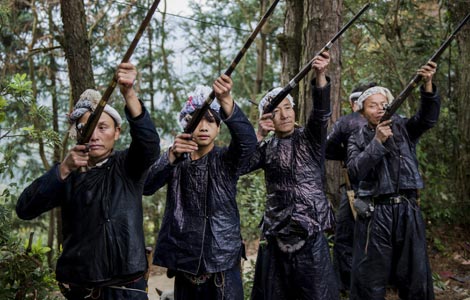Stateless residents fight for sense of belonging in Brunei
Updated: 2013-12-19 08:28
By Zhao Shengnan in Bandar Seri Begawan, Brunei (China Daily USA)
|
||||||||
There is a special group of ethnic Chinese in Brunei: they were born and raised in the country; they are well-off, well-educated and enjoy social status. They also love the country.
However, what is printed in the "nationality" column of their passport is not "Brunei". It once read "stateless" but now declares "permanent resident".
Lim Boon Hwa, 65, is one of the hundreds of thousands of these residents but he played a leading role, with others, in getting "stateless" removed.
"We held British passports under Britain's colonization. Then after independence, we became stateless. Why have things become worse?" asked Lim, vice-president of the Brunei-China Friendship Association and a businessman.
In Brunei, a multi-ethnic former British colony in Southeast Asia, citizenship, along with a range of rights and social welfare, is not granted automatically to everyone born within its borders, but is determined by ethnic descent.
After independence in 1984, only about 9,000 ethnic Chinese were given full Brunei citizenship. The others, about 20,000, like Lim, lost their nationality.
"I had to have a visa when going in or out of my own country, and whenever I went through customs abroad, I had to prove, with a lot of cash in hand, that I was not a refugee," he said.
Citizenship could be obtained if applicants had resided in the country for 25 consecutive years, and met language and cultural qualifications. But the complicated Malay language exam, which apparently required a detailed knowledge of the terms for local plants and animals, led many Chinese to emigrate.
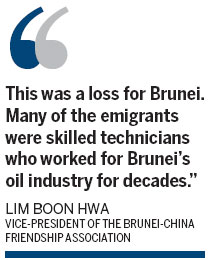
"This was a loss for Brunei. Many of the emigrants were skilled technicians who worked for Brunei's oil industry for decades," said Lim.
Lim failed the exam twice and thought of moving to Australia. But he eventually decided to stay and try to change the system, which only allowed 200 people to take the exam every year.
"We respect the Constitution. But the exam's purpose should be to invite those who are qualified to be citizens, instead of going against them. I wouldn't have passed it even if I tried a hundred times; or, I would have passed away before I got it," he said.
After discussions with the Chinese community, Lim and two others prepared a memorandum for Brunei's government, suggesting it narrow the scope of the exam and increase the number of times people could sit it.
"Some people said it was not a good idea saying 'no' to the government, but I think we had to make them aware of our predicament," said Lim, who could recall every detail of the preparation process.
"The lucky thing was that Brunei's government encouraged improvement if you managed to prove something was flawed," he said.
Lim did it. Reform of the nationality law, passed in the early 2000s, allows stateless persons over the age of 50 to acquire citizenship by passing an oral, rather than a written, nationality test. Every test now allows 1,000 people to sit it.
But because of a strong background in education, Lim was excluded from the oral test, while others gained from his hard work.
(China Daily USA 12/19/2013 page6)
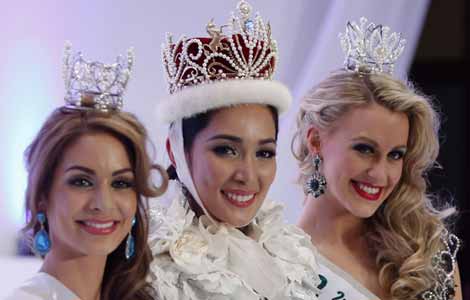
 Misses International shine in Tokyo
Misses International shine in Tokyo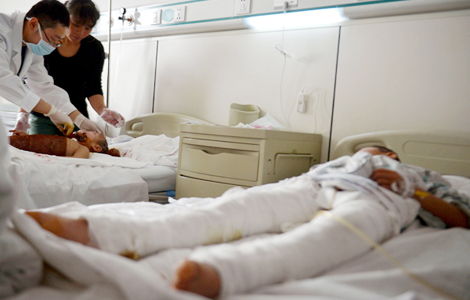
 Parents urged to supervise children's TV-viewing habits
Parents urged to supervise children's TV-viewing habits
 Jazzing up Beijing
Jazzing up Beijing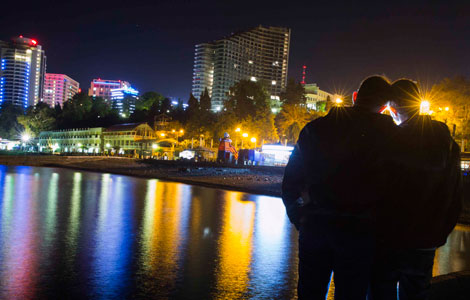
 US delegation to Sochi includes gay athletes
US delegation to Sochi includes gay athletes
 Snow storm wallops NE USA
Snow storm wallops NE USA Russia to bail out Ukraine for $15 billion
Russia to bail out Ukraine for $15 billion
 Fatal tiger attack 'points to flaws in zoo management'
Fatal tiger attack 'points to flaws in zoo management'
 Merkel sworn in as chancellor for a third term
Merkel sworn in as chancellor for a third term
Most Viewed
Editor's Picks

|

|

|

|

|

|
Today's Top News
Baucus likely next ambassador to China
Senator Baucus to be named ambassador to China
China’s leaders must lead on clean energy: report
Treasure Island still radioactive?
Military plays down 'near-miss' between warships
Fed to cut bond purchases by $10B
Overseas investing sees large jump
China expands research in Antarctica
US Weekly

|

|


